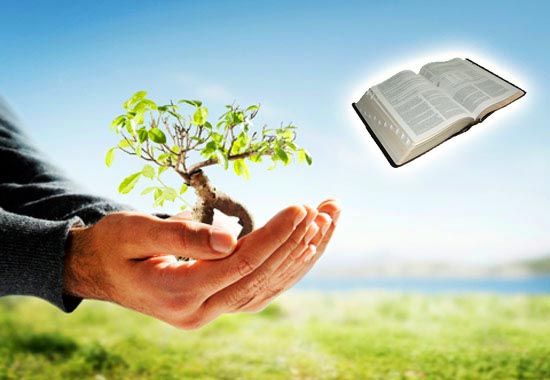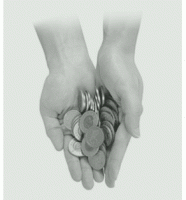Scripture and the Fathers
When we think of the term stewardship, we frequently consider only matters related to financial support. The prevalent rendering of the term oikonomia as “stewardship” or “economy” is not very illuminating as it provides both a linguistic as well as conceptual reduction of this critical and originally scriptural word. In so doing, however, we have narrowed the scope of the Bible’s teaching and neglected the depth of our Church’s tradition about our place and role in the world, indeed at a time when such knowledge is more vital and critical than ever before.
If we turn to the Church Fathers, we see that they attribute the highest importance to oikonomia (stewardship or economy), which in their eyes implied a broader and more inclusive concept of revelation and salvation, identified withGod’s vision and desire to save the whole world. For our great theological teachers and spiritual masters, economy in fact refers to our very salvation by the allembracing love of God for all humankind and to the universal compassion of the Creator for all creation.
Somewhere along the line, we unfortunately shrunk the theme of “stewardship” to purely monetary terms that primarily include making contributions to philanthropic organizations – probably as a result of a narrow interpretation of scripture, and possibly as a result of the rigid focus of modern society.
All of this invariably affects not just our understanding of the moral obligation that we have toward one another as human beings, but also inevitably distorts the worldview that shapes our moral responsibility toward creation. By limiting our attention to divine commandments for human compassion, we have invariably excised from scripture the clear mandate to creation care.
Yet, these two dimensions of Christian life are integrally interrelated; one cannot envisage human progress without ecological preservation. The way we treat God’s creation in nature essentially reflects the way we respect human beings created “in the image and likeness of God.” The reality is that we should respond to nature with the same tenderness that we are called to respond to people.
All of our spiritual activities are ultimately measured by their impact on the natural creation; just as all of our ecological choices are finally evaluated by their effect on the poor.
The Sin of Neglect; the Arrogance of Domination
It is no wonder, then, that our Ecumenical Patriarch Bartholomew surprised the theological and secular worlds alike when he identified carelessness or indifference to the natural environment as tantamount to sin. It is plainly wrong to regard sin as the negative impact of our behavior on other people, whether individually or collectively, while disregarding the ecological and cosmological consequences of our actions (or inaction). As His All-Holiness remarked at Santa Barbara in 1997:
“For human beings to cause species to become extinct and to destroy the biological diversity of God’s creation, for humans to degrade the integrity of the earth by causing changes in its climate, stripping the earth of its natural forests, or destroying its wetlands …for humans to contaminate the earth’s waters, its land, its air, and its life with poisonous substances – all these are sins.”
The vocation and covenant to cherish care for the creation is the principal reason for which God placed Adam and
Eve in the garden of Eden (Genesis 2.15), namely “to till and keep it” – a phrase I like to translate (based more closely and literally on the Greek translation of the Septuagint) as “to serve and preserve it.”
It has not, of course, helped in the least that we have also misconstrued the Biblical term “dominion” (in Genesis1.28 and Psalm 8.5-8) as “domination” in an unashamedly self-centered and self-serving manner; after all, “dominion belongs only to the Lord.” (Psalm 22.28) Any authority over creation implies ruling in accordance with the love, peace, and justice of the Creator.
Whether for fear of pagan idolatry or out of a sense of arrogant selfishness, there is no doubt that – over the centuries and in our own lives – we have overemphasized the unique role of humanity. Anthropocentrism is the “original sin” – albeit an entrancing temptation – to which we are all guilty of succumbing at one time or another, and which has detrimentally burdened our perspective and practice. “The whole of creation has been groaning together in pain until now, inwardly awaiting its liberation by the children of God.” (Romans 8.22-23)
What Can I Do?
There are numerous practical ideas available and readily accessible today for parishes and families that choose to become aware of their ecological impact on the planet and on people. Indeed, some of our Orthodox parishes – and even more of our sister Christian congregations – have already undertaken initial steps or else made considerable progress toward this goal.
Seeking their counsel, or offering our advice to others, is undoubtedly a fundamental form of sharing and communion. Alternatively, parishes may consult professional environmental and energy auditors, often freely at the disposal of local communities.
Parishes and parishioners can make a difference by becoming sensitive to what they use (energy-efficient light bulbs and heating/cooling systems), what they can reuse (recycled paper, bags, ink cartridges, glassware and cutlery), what they waste (electricity, water, heat, energy, even cups and plates), and what they do (carpooling or support of local products).
Most importantly, however, we can all learn to do and live with less. In order to alter our self-image, what is required is nothing less than a radical reversal of our perspectives and practices. The balance of the world has been shattered.
The ecological crisis will not be solved with sentimental slogans or smiley stickers but by proposing self-denial as a solution to self-centeredness or selfishness, by learning to exercise self-control or self-restraint, by the ability to say “no” or “enough.”
Here, I think, lies the heart of the problem. For we are unwilling – in fact, violently resist any call – to adopt simpler lifestyles.
We have misplaced the spirituality of frugality and abstinence. The challenge is this: How do we live in such a way that promotes harmony – not division? How can we acknowledge – daily – “the earth as the Lord’s” (Psalm 23.1)?
This means that stewardship opens up more than simply our pockets and our hands to charitable institutions and tax-deductible options. It opens up our eyes and our hearts to proper and harmonious relations among all of God’s creatures. Learning to give up in a spirit of self-control implies learning to give in a spirit of sharing. It is learning to live in such a way that communicates gratitude and generosity, not avarice and greed.
Am I Accountable?
While there are numerous passages in the Old and New Testaments that provide insight into the principle and practice of stewardship – intimately relating its social and ecological aspects – it is a message that acquires increasing urgency in light of our ultimate accountability on the day of judgment with Christ’s parable about the faithful and prudent steward in Luke chapter 12, which concludes with the following warning: “From everyone to whom much has been given, more will be required; and from the one to whom much has been entrusted, even more will be demanded.” (verse 48)
This is a verse that might not meet with general agreement on a political level; yet it is a statement that deserves close attention on a spiritual level: “Blessed is that servant whom his master will find so doing when he comes.” (verse 43)
Like the servant in the parable we, too, will be asked for accountability by the Master: “What is this that I hear about you? Give me an account of your management.” (Luke 16.2) We will surely be judged for the abuse of the earth that has been entrusted to us “to preserve,” as for the unjust distribution of its resources to human beings that we are called “to serve” – for the devastation of God’s creation by human beings unjustly usurping the right to control it and arrogantly presuming the right to manipulate it, as for the exploitation of the poor (and the poor nations) by the rich (and the rich nations).
If we open ourselves – avail ourselves and become sensitive – to all people and to the whole creation, then we shall recognize our history as inextricably linked to the destiny of the world.
We shall begin to perceive the universe in its unfathomable interconnectedness, and we shall surely feel the spirit of God as a gentle breeze and hear the seal’s heartbeat as the pulse of our own life.
Further Reading
For further information on this subject, consult the Orthodox Fellowship of the Transfiguration, a ministry officially endorsed by the Assembly of Canonical Orthodox Bishops: www.orth-transfiguration.org.
For details on how to achieve greater awareness and environmental action in your community, see F. Krueger (ed.), Greening the Orthodox Parish: A Handbook for Christian Ecological Practice, CreateSpace Independent Publishing,
2012 (www.CreateSpace.com, book number 3776415). Also available from www.amazon. com; and The Orthodox Fellowship of the Transfiguration, c/o 887 Sebastopol Road, Suite A, Santa Rosa, CA 95407-6828. For a comprehensive list of (over 2,000) scriptural passages highlighting creation care and ecological stewardship, see The Green Bible, HarperOne, 2008.
Rev. Dr. John Chryssavgis is a deacon of the Ecumenical Office. He is also Archdeacon of the Ecumenical Patriarchate, where he serves as theological advisor to His All-Holiness on environmental issues.
Source: Orthodox Observer, March 2013

















